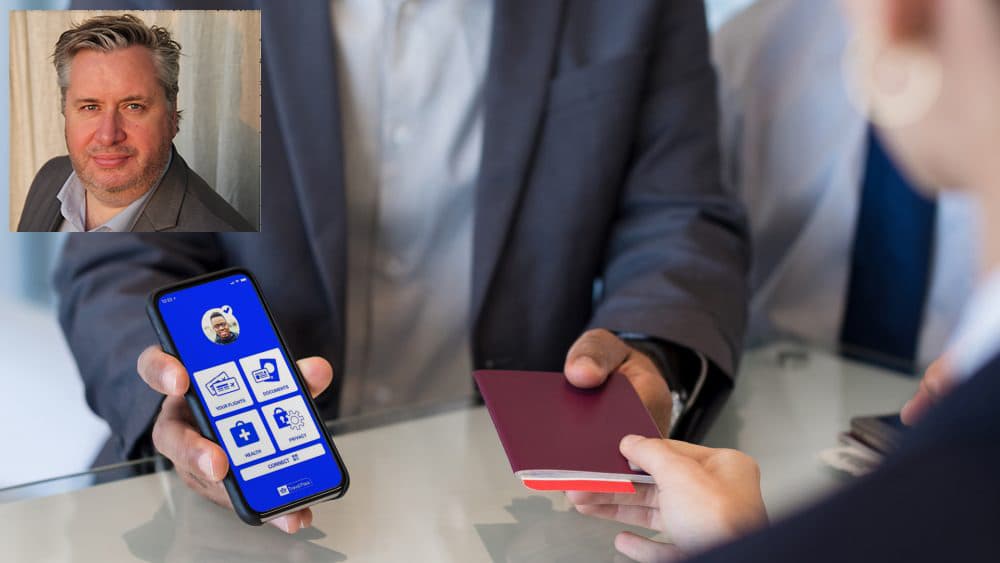

Dubliner Alan Murray Hayden is Head of Airport Passenger and Security Products at the International Air Transport Association (IATA) – and his team are the creators of a piece of tech that is going to help us start travelling again: the Travel Pass. In this exclusive interview for ITTN, he explains how it works and what it means for the future of travel. Watch the video below.
It’s been quite the journey for the 1995 DIT graduate, who has spent his whole career in aviation – firstly with TNT in Amsterdam and, since 2005 IATA, where he helped develop the Timatic immigration database, which is used by airlines and agents to verify travel document requirements to make sure passengers are compliant with border control rules and regulations. In 2019, 800 million passengers – roughly 50% of all international passengers – were processed using Timatic. So when it came time to work on a solution to the new issue of verifying PCR tests and vaccinations, Alan and his team where perfectly positioned.
The Travel Pass is a new, digital app where passengers can safely store all vaccine and test information in one place and – most importantly – that information is verified and authorised as legitimate by the airlines
From his base in Geneva, Alan explained that even though there’s comparatively little travel at the moment, airports are currently at full capacity just checking the physical documents that allow people to travel – mostly PCR test results. Enter the Travel Pass.
Empty Airports Are Very Busy
“Even if we wanted to double the amount of passengers carrying, we couldn’t if we have to keep on manually checking people,” he says. “So the purpose behind the IATA Travel Pass is to enable passengers to receive their test results in a verifiable manner, and then share them with the airlines, again in a verifiable manner before they get to the airport.” The test results, the proof of vaccination – they’re sent directly to your phone from the various labs where the tests are conducted.
Is it Safe?
The key, Alan says, is that all the checks – proof of passport, verified test results, a vaccination certificate – is all done before you get to the airport, so passengers can show up and just go right through, much like a self-service option.
One of the main issues around these kinds of apps is an issue of security of information – after all, you’re storing personal medical information as well as your identity in one place, but Alan explains that the Travel App is based on “decentralised principles…Your passport details and your health details will remain on the phone. There is no central storage of that data; IATA does not have access to that data. You, the passenger, can choose to share that with both the airline and the government. And when that happens, the data gets sent directly to the airline and the government.”
It’ll Be Integrated Into Airline Apps

Although the current Travel Pass is currently its own separate app which passengers will initially download into their phones, Alan makes the point that in the future, airlines will integrate the underlying technology of the Travel Pass into their own apps. “And that’s really key,” he says, “because the three airlines I fly are always Aer Lingus, KLM, and easyJet. And I have all three of those apps on my phone, and that’s where I want to do all of this. I don’t want to be going to my IATA app or some other app.”
When Will Travel Pass Be Put Into Widespread Use?
As we have reported over the last couple of months, a number of airlines have been testing the Travel Pass, including Emirates, Qatar and Etihad. The next step, Alan says is to pilot the app fully in March: Singapore Airlines will kick it off, followed by Qantas and Qatar Airlines. “And then we will be launching with a number of different airlines from April time with probably have another 20, 25 different airlines. So that’s all on track.”
The Irishman Who Could Save Travel?
We put it to Alan that his work is quite important in that he literally could be saving travel, but with typical Irish modesty he batted off the question and told us that he was just a “small cog in the wheel.” But we’re hugely impressed and proud that one of our own is on the front line of helping to restore travel!




